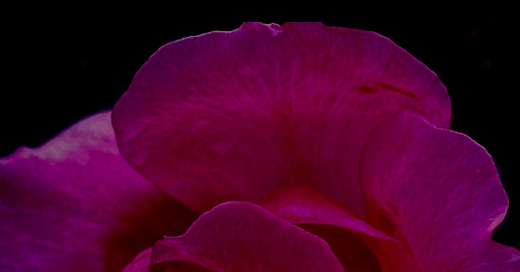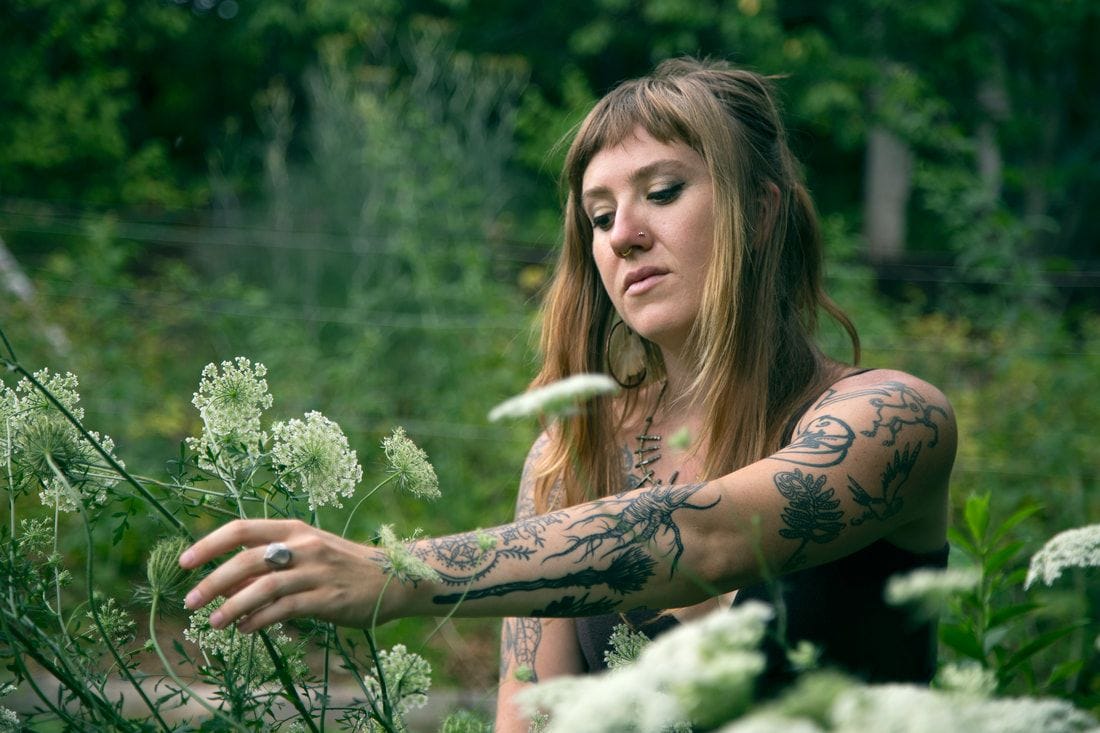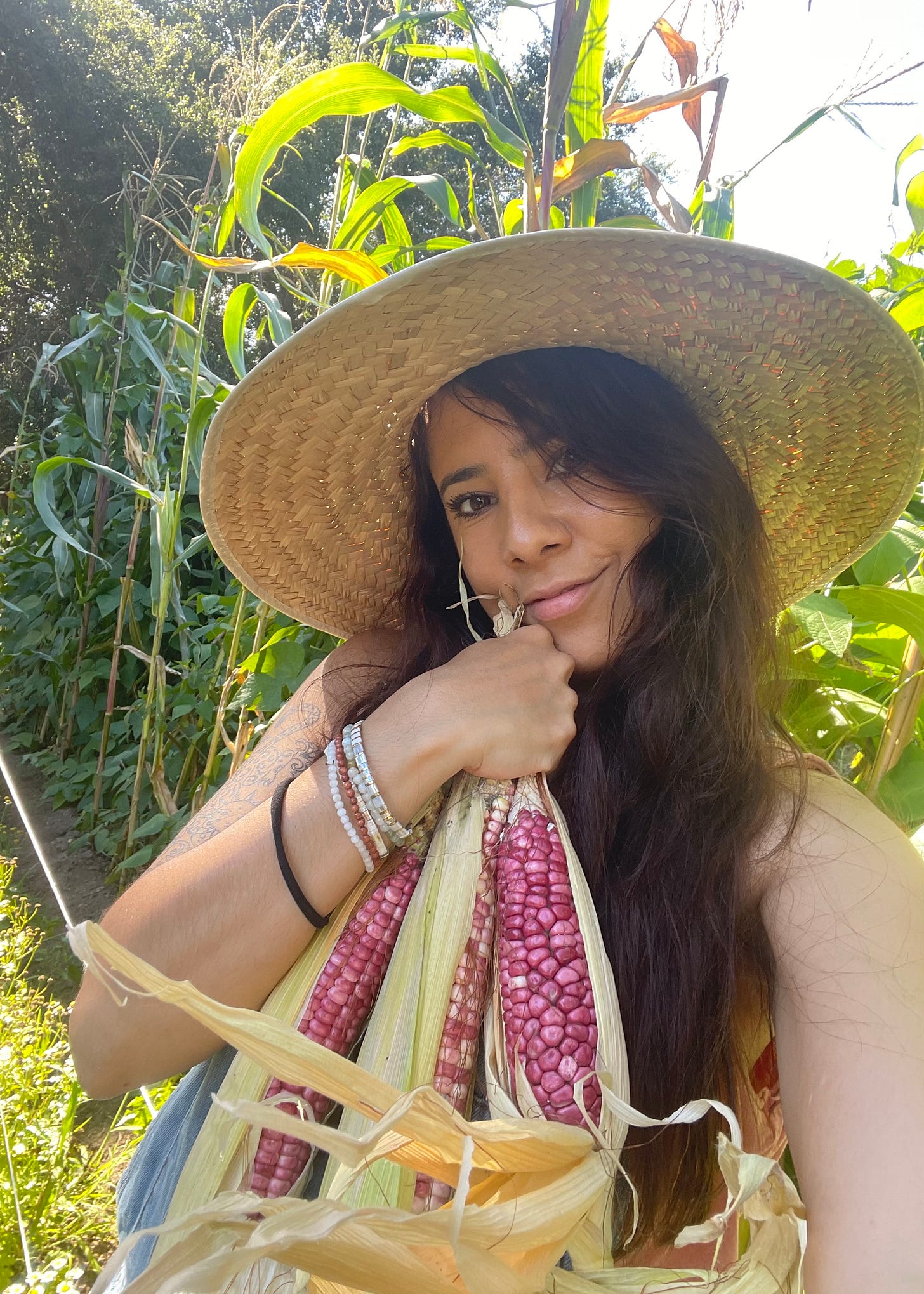Plants as Death Doulas: 4 Ways Plants Support us in Grief & Troubled Times
+ Introducing guest instructors for herbalism for grief support!
Inside: 4 ways plants support us in grief & troubled times & introductions to 3 of our guest instructors for herbalism for grief support, which is discounted for 3 more days!
Dear Shapeshifters,
I cannot stress enough that I would not be where I am without the plants that have supported me. When I cared for my dad as he was dying, and then my dog as she was dying, and then myself through the grief and fear of living with chronic respiratory illness during a global pandemic, I was held and nourished by the magic and medicine of plants. They continue to hold and ground me through the trouble of these times.
My relationships with plants have also helped me to have a more multitudinous understanding of myself and the self in general. I am part Motherwort, part Rose, part soggy Mimosa blossom, part sweet Chamomile, part tight fist and spilling open Peony, part prickly Saguaro, and cracked Alligator Juniper. They are in my blood stream and my imagination, moving me through this world in ways I conscious and unconscious of.
And I believe that each of us is actually an assemblage of beings - not just an individual - but a web of creatures - an extension of ancestors both human and more than.
Plants as Death Doulas
In addition to being reminders of our multitudes, I have come to understand plants as death doulas, in their capacity to ease the passage, help us meet our edges, and hold, nourish, anchor, and inspire us through big D and little d deaths.
And herbal medicine has played a supportive role in grief and death care since antiquity.
Herbal remedies have been used to comfort the hearts of the dying, their loved ones, and caregivers; used in rituals of care for the dying, such as washing and bathing; and incorporated into rituals of care for the dead and the bereaved.
Gentle medicines such as flower essences, teas, herbal-infused oils, aromatic herbs, and floral bouquets for altars have been brought into these spaces.
Flowers have long provoked thoughts of ephemerality, cycles of life and death, and been involved in death rituals, being planted in graves, strewn atop of them, and used to bless and decorate the bodies of the dead. Humans have been burying their dead with medicinal plants and flowers as long as 60,000 years ago.
Just as we are multitudes, there are multitudes of ways that plants support us in troubled and grief filled times.
Here are just four.
4 Ways Plants Support us in Troubled & Grief Filled Times
Providing First Aid for Acute Grief, Trauma, & Heartbreak
There are so many plants whose relaxing and supportive effects can be experienced immediately in times of rupture. The hope isn’t to cure or fix grief, but to support our grieving bodies. Herbal remedies can help us fall asleep, get better rest, take deeper breaths, digest and get more nourishment from our food. We can bring in gentle nervines like Lavender, Rose, Lemon Balm, and Chamomile to help soothe frayed nervous systems. We can bring in nervines that are also heart tonics, like Motherwort, to soothe and calm racing hearts. We can slow down and drop in with heart centering Rose. We can bring in fast acting nervine relaxants like Anemone when we are experiencing panic.
Providing Long Term Nourishment for our Nervous Systems & Communities
There are also so many ways that plants help our grieving bodies over time. Working with adaptogens and nervine tonics like Ashwagandha and Milky Oats can go a long way, as these plants greatly improve our bodies’ capacity to adapt to long term stress of living with big grief. Developing our practices of herbal medicine in general over time also helps us build muscles of care for ourselves and one another, which can hold and nourish us and our communities for years to come.
Ritual Making, Storytelling, & Creating Space for Embodiment & Beauty
Beyond the physiological benefits of ingesting various herbal remedies, herbal medicine invites us into deeper relationship with plants and ourselves, and the healing power of stories and ritual. Without consuming anything, plants can provide tremendous support for us when incorporated into our grief rituals, as they have for millennia. Slowing down to give plants our attention helps us create space for embodiment and breath in times of urgency, creating space for us to notice and be with beauty, to attune to what brings us pleasure, to deepen into our senses and come back into our bodies. Creating a floral arrangement or offering for an altar, for example, or tucking a sprig of Thyme into your shirt to summon courage, or stopping to breathe beneath the Ponderosa. When we build our relationships with plants, we start to see that we have allies and teachers in being with grief and loss everywhere.
Giving our hands something to do (to resurrect our agency wherever we can)
In addition to the incredible and multitudes of ways plants support our bodies physiologically in times of grief and connect us to a web of support, herbal medicine can help us remember our agency. Often, when we are in the face of great uncertainty, intensity, trauma, or loss, we may find ourselves feeling a profound loss of control. It’s easy to spiral there, or to freeze, or to collapse, to be unable to see a way through. The role of the doula is often to help each other remember and lean into the places we have agency. What action can we take, however small, to resurrect our sense of agency and feel our way through? Herbal medicine is one place we can put our hands. We can draw one another herbal baths, make each other strong cups of tea, give ourselves or another massage with an herbal infused salve or oil, or place a few drops of tincture on our tongues. Making herbal medicine gives us “mundane, miraculous” place to put our hands and in doing so, gives us a tether to community, human and more than, and our own capacity to make medicine in this world (adrienne maree brown).
With fierce care,
Mara June
Let us know what plants and herbal practices you feel connected to and supported by in the comments below!
Herbalism For Grief Support - Now enrolling & Discounted for 3 more days!
Registration is now open for our Herbalism for Grief Support course beginning in January, and it's discounted for those who sign up by November 25th!
After taking most of the year off from offering Herbalism for Grief Support, I'm really excited to be offering it again, this time restructured with more medicine making days and guest workshops with Damiana Calvario, Lee Datura, Rebecca Beyer, & other incredibly magical humans — see their bios and details below!
I hope to see you there.
3 of our Guest Instructors for Herbalism for Grief Support
Rebecca Beyer
Rebecca Beyer is one of my beloved teachers here in Appalachia, and her studio was destroyed in Hurricane Helene. She’ll be leading us in an ancestral herbalism for grief support workshop, using folklore and practices from her diaspora- from ancestors in Germany, Ireland, England, and Poland.
Rebecca is the woman behind the Blood and Spicebush School of Old Craft. She lives in the mountains of Western North Carolina where she teaches people how to integrate the Old Ways back into a cyclical life and works as a tattooer.
Rebecca practices, researches and writes about Appalachian Folk Magic, Traditional Witchcraft, Primitive Skills, Homesteading, Foraging, Appalachian Ethnobotany and European and Appalachian Folk Ways.
Follow Rebecca on Instagram @bloodandspicebush
Rebecca’s website
Damiana Calvario
Damiana Calvario teaches one of the most powerful workshops on flower essences I’ve ever been to, and I am so grateful to have her magic and wisdom in our space. She’ll be leading us in a Decolonizing Flower Essences workshop!
Damiana is a Mixed woman of color, daughter, sister, caregiver, community member, survivor, and first generation immigrant. Her practice, rooted in care work and mutual aid, blends together her Mexican roots, mixed upbringing, food as medicine, Curanderismo studies, Traditional Mexican Medicine and western herbalism training.
Follow Damiana on Instagram @laluneria.
Damiana's website
Lee Datura
I’ve known Lee for years, and her somatic guidance continues to be the nourishing foundation for my work. Lee will be leading us in an orientation to our nervous systems, for which I am deeply grateful!
Lee is a somatic practitioner and biodynamic craniosacral therapist. Her work centers supporting folks healing from burnout, emotional and physical trauma and creating a deeply compassionate container for learning tools to support the nervous system. She offers 1:1 somatic coaching in person or online as well as group nervous system workshops and courses. She believes healing means coming home to our very nature, that we are fractals of the inconceivable magic of the ecosystem, planet and galaxy around us & that healing happens in relationship.
Follow Lee on Instagram @datura_somatics
Lee’s website
More guest instructors tba!
Subscribe to Grief Spells
Your subscriptions help support my work and help us skirt the whims of the algorithm! As of right now, all subscription tiers (including free) will receive access to seasonal grief spells, and any other writing I share in between.
You can also support my writing by becoming a paid subscriber to this newsletter for $16-20/month 💖 Your paid subscriptions help me so that I don't have to spend as much time marketing, and can instead focus on creating and doing what I love. THANK YOU!
Paid subscribers will also get access to live community events each season. These Grief Studios will be spaces to dialogue with, make, and share your own art and writing alongside other grievers. 🕸️








Mmmm such powerful medicine you share. Blue vervain has been an ally to tend the wound, and I recently made a flower essence of evening primrose and I can feel the alchemy of birthing new neural paths to honor life. Blessings to you for reminding us all.